“Saltwater Cowboy” is a sharply perceived portrait of an extraordinary father, a man who served in the Navy, served on ships, all his life and left his son an indelible image of competence, courage, devotion and panache. Joe Milan lives in South Korea; this is his second contribution to NC. It’s a wonderful addition to our growing collection of fatherhood texts (we have a series of set essay topics — see them all here at Numéro Cinq Anthologies).
dg
—
My father said his life started at nineteen, the moment he decided to join the Navy. On a muggy August afternoon, he was sharing a bottle of Jack Daniels on a porch with a guy everyone called Bud. About halfway down the bottle my father blurted out, “Let’s go join the Navy.” They roared down the country roads in my father’s 60’s Datsun truck with holes in the floorboard, over the low hills of houses and trees where there are no dogs – only hounds — between the square plots of soybean and cotton, and into town to the recruiting office.
The recruiter showed pictures of girls and oceans and beaches and elephants of the Pacific and had them take the test and sign the papers. Two days later, after his family disapproved and said they wouldn’t let him go – “try to stop me” – my father and Bud were on a bus to Chicago and boot camp. They stayed the night in a motel along the way, and in the morning when my father woke, Bud was gone. Bud went home.
My father always left out everything that happened before that moment on the porch. For me, scraping the memories for stories my father told me when he had too much to drink, the moment my father’s life truly started was in a break room in a factory. After dropping out of high school, he worked at a rubber plant, constantly bombarded by chemical dust that stuck to his skin like paint. Once in the break room during lunch, a co-worker, who had lived his entire life in town working at the rubber factory, stood by the punch clock for a long moment. He looked around the room at the men in overalls, then down at his timecard. He muttered and then dropped to the tile floor, dead. Stroke.
* * *
Bedtime stories for me were Navy stories. Often they started when I asked about his tattoos, the cross anchors on his hands, the ships at full sail and winking girls in scanty sailor uniforms on his arms and shoulders. “Well, I got this one when we were pulling liberty in…” I heard about Singapore, Subic, Perth, Bangkok, well before Washington DC or New York. Every room was smoky. Dust trailed the speeding jeepnies and tuk tuks. Gun shots rang off in the distance. Men with names like Dirty Dan, The Fighting CB, and Matta gulped burning whisky and broke the empties on the dirt road and howled at the sky. Men fought over pool games and threw each other out of windows that had already lost their panes.
“Why, Dad?”
“That’s what young men do, have a good time,” he said. “It was fast living, boy. Real fast.”
My father, adventuring through these places, was as mythical to me as a Hollywood cowboy. And like a cowboy, he told me about vastness of space – blue fields of ocean instead of the prairie. The ocean could be as still one moment and stampeding over the deck the next. My father lived in the thick of dangerous waters and tumultuous towns.
If my father had faith in anything, it was that he could handle ships. There could be a twenty-knot wind out of the west, the port engine could die on the ship, the navigator could panic since the pier cleats weren’t where they were marked on the chart, and my father, looking out the window, could drive an eleven hundred foot carrier along the pier softly. “It’s what I do,” he would say. Within ten years of joining the navy, he had moved up the ranks from a sailor mop jockeying on the deck to a harbor pilot who docked ships into port and sent them out to sea.
Sometimes, when I was about ten, my father brought me to work. I rode the tugboats that dropped him off on Trident Submarines that he guided out into the dark tree-lined fjord of Puget Sound. When the job was done, the tugboat would come alongside the moving submarine and he would jump, without a lifejacket, back onto the tug as if it were nothing. As if one slip couldn’t send him under the icy water and the wake couldn’t suck him under to the propellers.
On the way back, my father would ask the tug captain if they’d let me on the wheel. I never wanted to be on the wheel. But soon I was grasping onto the wood handles, trying to not to hold my breath, steering the boat. “Just follow the wake of the other tugs,” he would tell me.
Advice from my father was always the same. On jumping from the high dive, “Just jump. Just go and do it.” On going to college, “Make it happen. Go and do it.” On becoming a writer, “Well, go and do it. Write.” Sometimes he added, “The worst thing you can do is overthink it, boy. Educated people sit around asking why the wind is blowing you toward the rocks. You don’t have time to ask. You just look out the window and react. Make a decision. Life doesn’t have time for you to worry it right. You just go out and do it.”
* * *
When my father retired from the Navy they gave him a party, a handshake and a shadow box filled with his service ribbons and brass plates recounting my father’s time in navy, most of it as a pilot. Piloting was what he wanted to do again. He studied charts, took tests and improved his maritime licenses. He applied for piloting jobs and flew out to Florida and Virginia for interviews. Each time he came back disappointed. And so we stayed near Seattle, not far from my father’s last duty station. Waiting, my father worked part time jobs, as a captain or a mate on ferries, tugboats, and science ships in the icy waters of the Northwest. There were a lot of days he didn’t work. On those days with a coffee in hand, he sat on the porch and watched the neighbor’s cat hunker behind the cul de sac sign and take a dump.
That’s also when people my father knew started dying. Bud was first, lung cancer. My uncle, my father’s brother, cancer. That one startles me even today. For the first and only time in my life I saw my father cry. After he hung up the phone, he clung onto my mother and me in the dark end of the hallway of our house. His face was hot and he heaved for air. My uncle died at fifty-four.
After eight years of trying, and waiting, he became a pilot again in Pearl Harbor, Hawaii. It was an October evening in 2003, after docking a couple of ships my father came home and had his first heart attack. On the phone he talked about his cholesterol levels as he would with tide tables or how much draft a ship had. Only when he had a physical would he signal his worry with a sigh and a “I gotta go, boy.” On the next call, “Boy, have a drink on me. The doctor said I’m in better shape then those twenty year old skulls on the ships I pilot.”
My parents came to see me in Korea to find me battered in the hospital. I had flown off a mountain bike crashed into a tree leaving my chest and spine a tangled mess of rattling broken bones to be fastened back together with bolts and plates of titanium, and someone else’s bones. The doctors told me I was lucky and I was: I would walk. I was alive. My father sat next to my bed, quietly rubbing the tattooed cross anchors on the back of his hand. Finally, he struggled out, “Sometimes a man has to know his limitations.” A line from Dirty Harry.
* * *
After my parents separated, my father told me about a dream he kept having about a ship he had served on before he became a pilot. My father had taken the old and mothballed ship out to be sunk for target practice. The ship went down, then his shipmates from my bedtime stories – the same ones from that very ship – started dying. Diabetes. Suicide. Heart attack. It wasn’t just his old shipmates. A pilot from a nearby port in Hawaii fell off a rope ladder while boarding a ship and was sucked under the waves. My father started wearing life jackets. My father hated life jackets.
“I keep seeing it,” he told me over the phone, “just like it was after we had hung off the sides and painted it. I’m there on the pier with my sea bag over my shoulder and I’m about to go up the gangway and the old chief stops me. ‘Sorry boats, Milan,’ he tells me, ‘not your time.’ I can see them, my shipmates, hollering at the seamen, getting them heaving on the lines, the boatswain whistles blowing. Then I see them all go, steaming away, leaving me alone on the pier with the seagulls dropping clams.”
Then came the skin cancer. Small spots like freckles on his bald head got radiated, leaving little pink scars. It also had burrowed into his ear canal. The doctors took it all out and covered his earhole with a flap of skin from his leg. “They might take my job from me. Might say they I’m not fit to pilot,” My father worried over the phone. I told him if that happened, we’d just open a bar in the Philippines and drink cheap wine. “I wouldn’t survive a week.”
The last time I visited him in Hawaii, we went shopping at a maritime store for fishing caps to keep the sun off his head. He would try a hat on and look at the mirror, shake his head and put it back. I said that we could get a sombrero. He could be the Mariachi Pilot. Then I asked him, “Do you feel like you’ve lost something? Like you’ve lost a bit of breath?”
He caught me off guard. “I don’t know, I guess. It’s like I lost something I can never have back.” He picked up a yellow fishing cap and looked in the mirror. He looked pale. He looked scared.
* * *
In college, I worked in film production. After the movie sets were torn down, when the only remains of the spectacle were naked concrete and traces of sawdust and sand, I’d always get a feeling that I was tiny and couldn’t say where the props had really been. I got that same feeling at my father’s memorial. There was a photo of my father from the bridge wing of a ship, grinning while looking down at the camera. He looked so happy. Yet, before I noticed the grin, I saw the life jacket.
One day I sat down at my desk and wrote this:
As the last hours of streetlight sliced through the blinds, my father stared up at the ceiling. Old photos in clean picture frames look out from the shelves. His shadow box is gathering dust. After a few sips of Kona decaf coffee, he sat and took his blood pressure. The machine groaned and tightened. It beeps and he wished he could still hear it without the muffle. The numbers say it’s a little low.
The harbor’s July air is thick and full of salt and diesel exhaust. The roads were still black from the morning mists. The waters rippled off the piers and the docked ships. From the wheelhouse of the tugboat steaming through the channel toward the job, my father didn’t notice the Arizona memorial raising its flag above the sunken hulk. His thoughts were on the job, and the depths of the harbor, the draft of the ship, and the breeze from the northeast.
A cargo ship deep in West Loach waited for him. It was a complicated job that would need all his focus. His strategy is to pull the ship from the pier with tugs, back slow and turn the ship 90 degrees, using the tugs, avoiding the other ships and the unseen shallows. Once the ship was in the channel he could drive the ship past the last turn and out to sea. The job was like moving a semi-truck out of a full parking lot, on ice, without brakes, with ball bearings instead of wheels, and little go carts pushing the trailer to keep it between the lines.
As he climbed the rope ladder to the access hatch in the wall of the gray hull, he clenched his teeth. Men can fall off into the green abyss. Big ships like this give men heartburn. They can smash into the pier or run aground. Lines from the tugs could part and whip back onto the deck. Anything can go wrong; everything can go wrong.
The sun broke through the clouds and it was hot under his life jacket.
On the bridge, my father smiled, and shook the captain’s hand. Harbor Pilots are faces of calm. The ship’s engines hummed and the crew checked the computer screens and hustled the lines. From the bridge wing, the tugs were small, as if they hadn’t grown up yet. He swallowed, keeping in the tension, focusing on the images burned in his mind of where and when each movement would begin and end.
The tugs heaved and the ship growled and shuddered as propellers started backing. Coffee brown silt swelled up staining the water. The ship had a deep draft and the bottom wasn’t much deeper. Lines moaned, water churned, radios crackled, my father’s forehead beaded with sweat. There was a knot twisting and tightening inside him.
For an hour my father crisscrossed from the port bridge wing to the starboard and back again, gauging distances, calling corrections to conn, and to the tugs. He fought sudden breezes, the ever-changing depths, the weariness of his body. Then finally, it happened. They cleared the tight loach and were moving toward the channel to the last turn and the ocean.
With the job essentially done, he looked down from the bridge, past the anchor winches and the stanchions of the deck to the dark green water just ahead. This is when he would laugh. A country boy from the fields of Tennessee had moved a mountain of steel.
But as the adrenaline faded, he didn’t laugh. When the ship made its last turn at Whiskey point, the point where the harbor opens up to the unending field of green then blue water of the Pacific, where the white caps clapped all the way to the line where the water splits with the cloud splattered sky, he looked up and knew he had gotten the ship out safely. And that was it.
—Joe Milan
————————————————-
Joe Milan has spent nearly a third of his life traveling and living outside the borders of the USA; his most recent landing is in Seoul where he writes and teaches at the Catholic University of Korea. He is a recent graduate from the Vermont College of Fine Arts MFA in Writing Program.
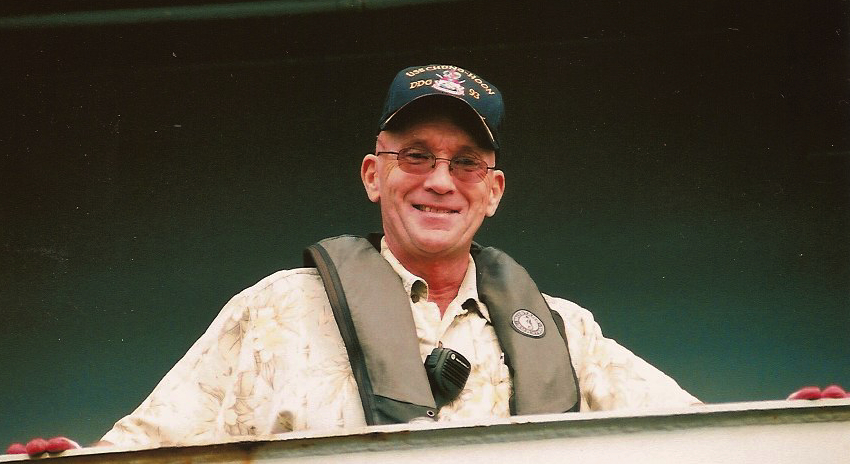
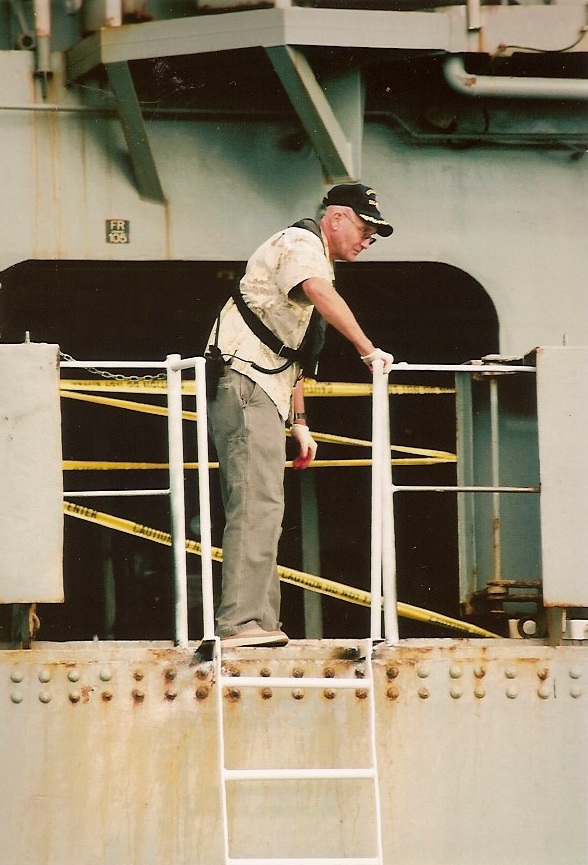
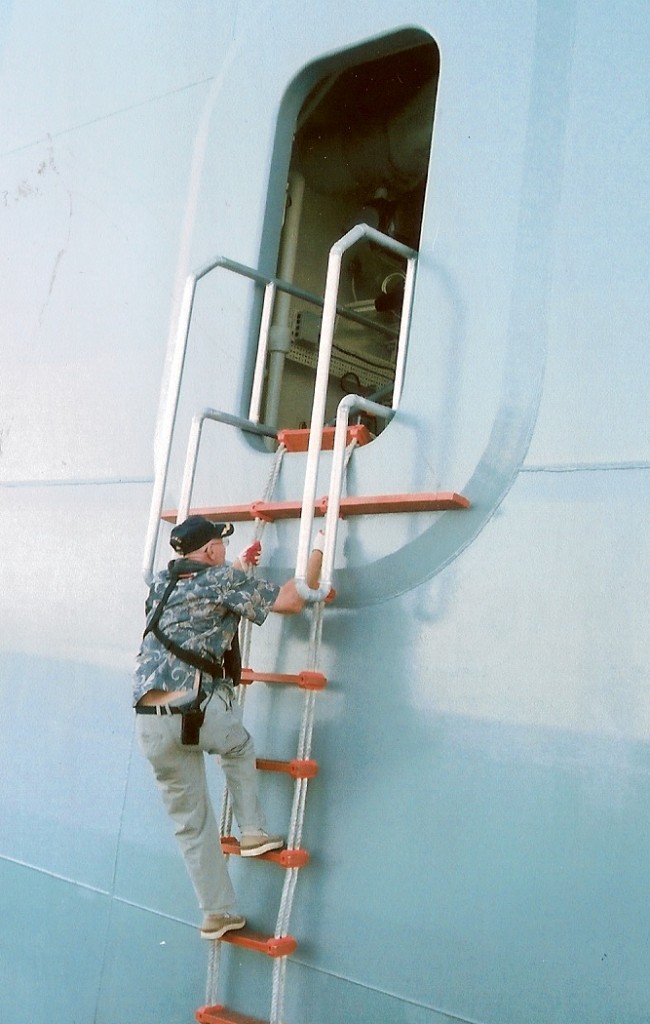
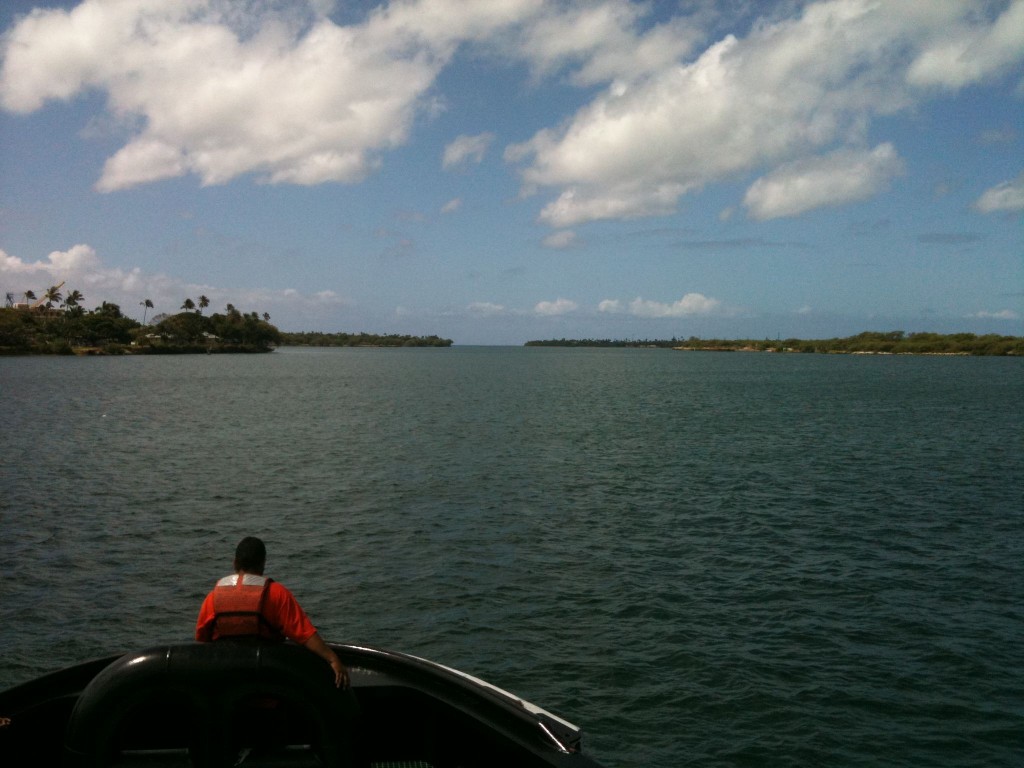
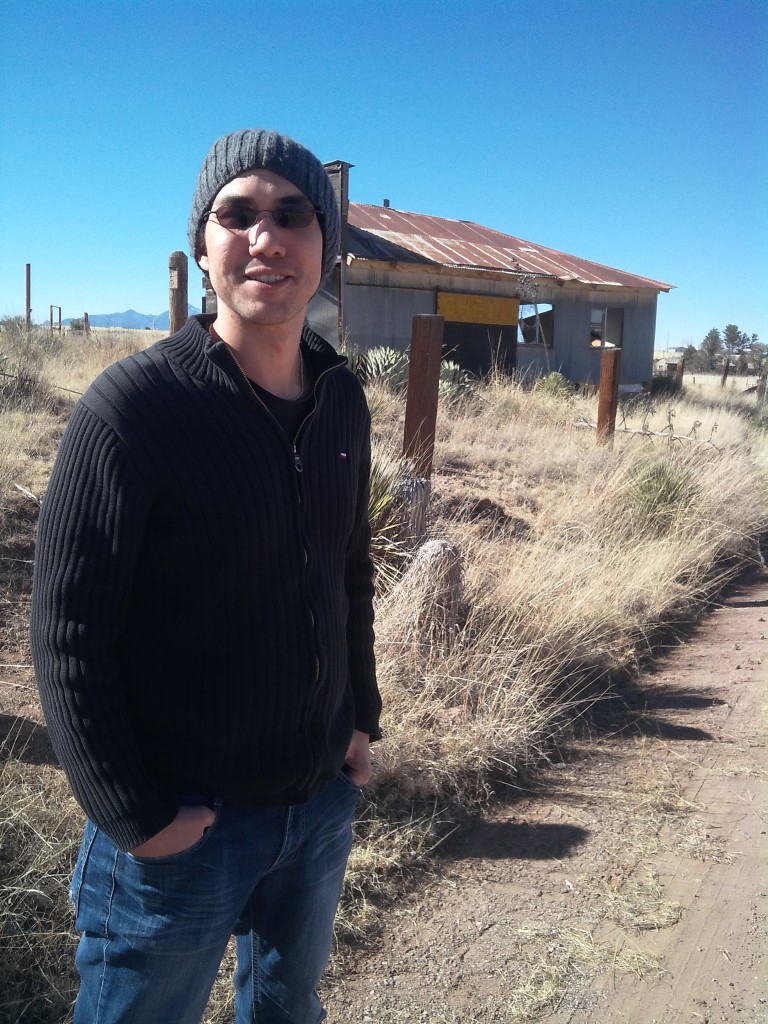
Lovely essay, Joe.
Lovely tribute, Joe.
Beautifully evocative, Joe. And lovely to hear about your life with your Dad.
Thank you, Joe. I loved reading about your father.
Thank you all for taking the time to read it. I greatly appreciate it.
Joe, I was one of the Tugboat Captains at Bangor. It was an Honor to have served with your Dad. I remember taking time to go with Him to watch you play football. You honored your Dad with a well written essay. what a lovely memory.
God Bless You.
Manuel! I remember that football game. I had a chance to run the football and I only got three yards. I felt a bit disappointed and I remember you told me that if I just kept getting three yards it would be a first down. I’ve often reminded myself of that through the years.
Thank you for the memory and for taking the time to read the essay.
Joe, I had the honor to serve twice with your Father. First was on board the USS White Plains AFS-4 and again at Port Operations in Yokosuka, Japan. He was a ture professional in every sense of the word.
Some of his best times in the Navy was on the White Plains and in Japan. His professionalism was something else. While driving a ship into port he would tell sea stories to loosen every one up on the bridge. I learned that professionalism doesn’t always mean you have to be serious. I often wonder if he was always like that or just later in his career.
I served with Master Chief MIlan in SB Bangor, he was a professional and every turn, he was always willing to help a young Sailor out with Pars, basic knot tying Etc: a great tribute
Thank you. He always felt that Sailors should know how to tie their knots. I was never any good at tying knots but he never held it against me.
Joe, your Dad would be even prouder of you after this great write-up. I served with your Dad on the tugs at Yokosuka, and him, JR Owens, and myself did plenty of liberty in and around Yokosuka. Had nothing but good times. Then we got together in Bremerton several years later, and again, went out on liberty all together, just like the good ‘ole days. He was a blast to party with, and a great shipmate. We also lost JR this past year to cancer. I have a friend living in Souel also, and visit him on occassion. Maybe we can hook up next time I make it over.
I’m sorry to hear about JR Owens. My father liked going out with all of you guys and talked fondly of those times. Of course, give me a heads up via email, joe@joemilanjr.com, the next time you’re on your way to Seoul and we’ll grab a beer.
Joe,
What a great tribute to a great man, your Dad. Knew him well, a great friend and Shipmate. I was stationed with him at Port Ops in Yokosuka in the Late ’80’s early ’90’s. He came down to our house in Port Orchard WA, in 1997 to see Jack Bove, a WWII vet from Yokosuka that was visiting. Fair Winds and Following Seas Joe, you are missed.
Thank you so much for reading and taking the time comment. It means a lot to me to see how many people still remember him fondly.
Having served with BM1 Joe Milan in USS White Plains, long before his days as a Navy Harbor Pilot, I enjoyed this candid look at the side of a man that although a shipmate I never knew. I watched your father excel at his profession over many many years and was proud of him. His passing came both as a shock and a remembrance of days past. This fine piece serves not only to honor him as only a son can do; but, also I hope as a healing for a great loss to not only you but his Shipmates as well.
David (Mac) McAllister
Lt United States Navy ret
Thank you so much for your kind words. Writing this was the single best thing I could do in order to heal and it makes me so happy that it continues to float out there and touch so many of my father’s friends that I never had the opportunity to meet.
If this is about Joe Milan from west tn I was his friend before he went to the navy, he diffinitly one of a kind I can still hear his laugh when we had had to many beers,we won’t forget him soon !!
A friend of mine gave me the heads up for this website and your “write.” I was also stationed with your dad and knew him both personally and professionally as well. He was a man with a mission and did it in a way that no one else could copy. He was unique in all that he did both on and off duty. I laughed with him to many times to remember and he was quick to the draw with “his only” original style of humor. He is missed by many and I’m sure more by you and your family. I know that I will never forget your Dad as he left a vivid picture in my mind. “Fair winds and following seas Joe.”
This is absolutely beautiful. I knew your father in high school, and he and friends would see who could tell the most outrageous story! He was always smiling and making others smile.